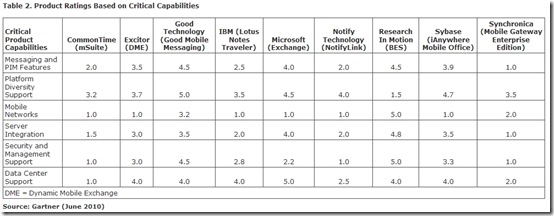 After writing my take on the enterprise email wars RIM is currently engaged in Simmons left a comment asking if solutions like Good Technologies change my analysis. I did some research since it has been awhile since I looked at solutions like Good Technologies and I found some interesting results. It seems like Good is making some headway in bringing security features to the iPhone and Android that BES deployments and BlackBerry users have built in. They are going down the path of creating a virtual secured sandbox where corporate information is stored and lets you lock down the device. It is an interesting development and RIM has already walked down this path with the employee owned policies they added in the latest update to BES.
After writing my take on the enterprise email wars RIM is currently engaged in Simmons left a comment asking if solutions like Good Technologies change my analysis. I did some research since it has been awhile since I looked at solutions like Good Technologies and I found some interesting results. It seems like Good is making some headway in bringing security features to the iPhone and Android that BES deployments and BlackBerry users have built in. They are going down the path of creating a virtual secured sandbox where corporate information is stored and lets you lock down the device. It is an interesting development and RIM has already walked down this path with the employee owned policies they added in the latest update to BES.
I am not expert in these other technologies but there are a few things I noticed:
- These apps tend to work in a sandbox and are not integrated in the device. I did not see features like RIM has where you can disable App World or even restrict what apps can be installed and what network they can connect to.
- They kind of remind me of how SSL VPN solutions work now but they still store confidential information on the device.
All in all the main thing I noticed is that there seems to be no third party validation that these solutions are inherently secure or have been tested to provide real world security. The closest I found was a very interesting Critical Capabilities comparison from June 2010 done by Gartner that was made available by Good Technologies on their product page. It is pretty high level but even it shows that RIM is the market leader in every category except for cross platform support (which is a given).
If you wanted to get some insight in how these different enterprise email solutions stack up check out the Gartner report below:
Check out some of the interesting charts from the report below:



MrSimmonsSr Not Registered
Posted: September 23, 2010 at 6:53 PM EST
Glad I could bring one more interesting data point to this already interesting discussion. I know some IT security teams are certainly doing their own testing of these types of solution and it will be interesting for me to hear what they find out.
I’m not that familiar with the Good Technologies solution myself, but I think that it is an interesting approach for an enterprise to consider if, and only if, they are interested in allowing their employees to have access to some corporate info on their own personal devices. I obviously wouldn’t consider it a replacement for the type of control that RIM and a good BES admin can give a company, but it is an interesting alternative if you’re only looking for a more secure way for your users to get some basic email and calendar support on their own devices.
Thanks, as always, for the interesting articles!
Lorenzo Codacci Not Registered
Posted: September 24, 2010 at 12:28 PM EST
As a BES expert since 2001 and a new fan of Good for Enterprise, i’d like to suggest people to REALLY test products before write an article like this.
Not only is clear that here Good has never been tested, but also that this article has a strong influence by RIM.
I’m totally disappointed when seeing professionals make un-costructive and btw wrong critics.
In particular:
1) “These apps tend to work in a sandbox and are not integrated in the device. I did not see features like RIM has where you can disable App World or even restrict what apps can be installed and what network they can connect to.”
THAT’S TOTALLY WRONG! Good for Enterprises has its own policies that allows admins to decide which apps could be used by end-users: about device integration, never heard about “consumerization”? The new trend of specifically separate enterprise data from consumer data?
2) “They kind of remind me of how SSL VPN solutions work now but they still store confidential information on the device”
There is no VPN between devices and Good server, architecture is the same of a BEs one with an internet NOC which controls traffic to and from carriers.